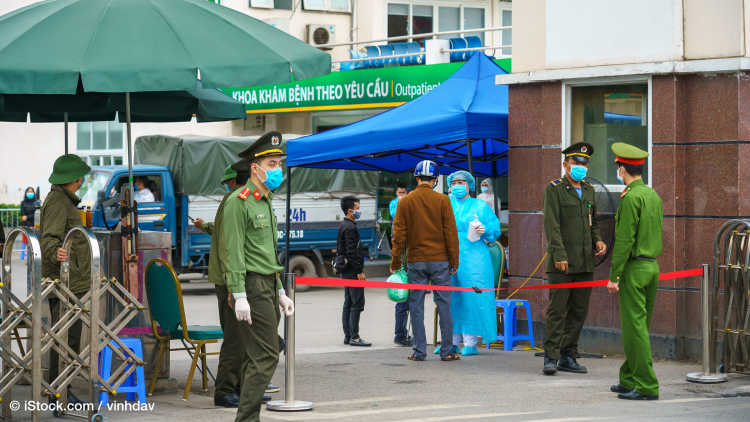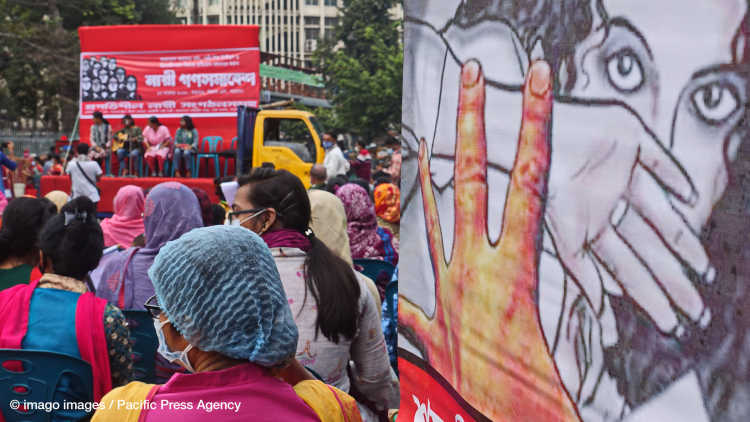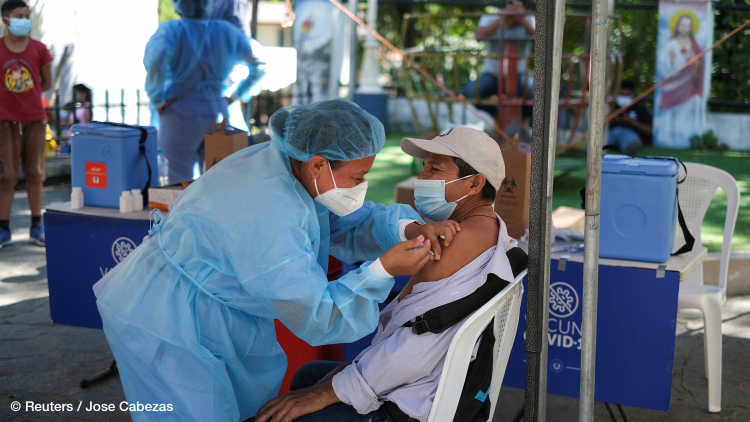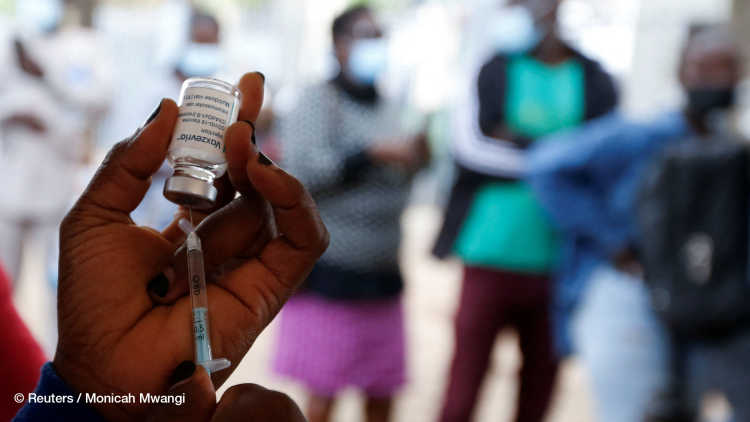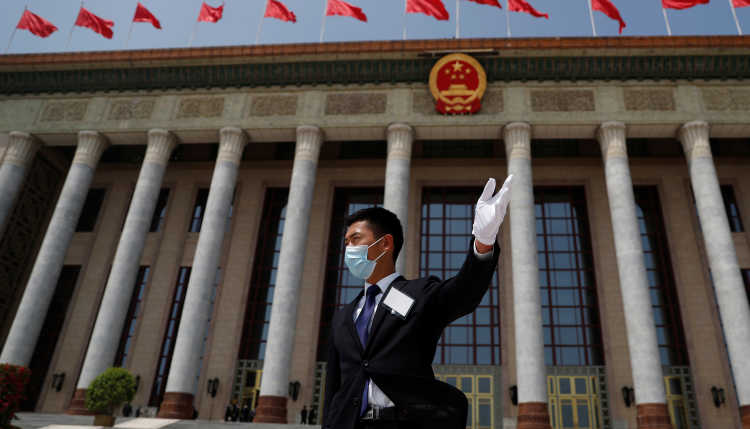- Home
- Publications
- GIGA Focus
- Challenging Trust in Government: COVID in Sub-Saharan Africa
GIGA Focus Africa
Challenging Trust in Government: COVID in Sub-Saharan Africa
Number 3 | 2021 | ISSN: 1862-3603

COVID-19, arguably the new millennium’s most trying test of state capacity, caught the world off guard. In order to contain the spread of the virus, governments had to respond quickly and comprehensively: strict lockdowns, movement restrictions, masks, and social distancing – measures that draw not only on public resources but also on the buy-in and cooperation of civil society. Citizen compliance and cooperation are founded on trust in government institutions. As such, the pandemic has also been a stress test for trust in government.
Trust in government is a crucial determinant of effective crisis management, and governments lacking such trust suffer a profound disadvantage.
In many instances, strict lockdown measures were accompanied by an expansion of executive powers. This creates power imbalances, or aggravates existing ones, and poses a threat to trust in government.
High levels of vaccine hesitancy, a looming recession, and expectations of government support require ongoing efforts to build and ensure trust in government.
Policy Implications
Even though many African countries seem to have gotten through the coronavirus crisis relatively well until now, vaccine hesitancy and looming recessions pose ongoing challenges for trust in government. Hence, governments must actively engage in building trust as they prepare for future crises. The Ebola epidemic has shown that a bottom-up approach entailing collaboration with pre-existing networks and institutions at the local level can facilitate this process. In contexts where executive powers have been expanded, the evolution of this process needs to be carefully monitored.
COVID-19: Did Sub-Saharan Africa Really Get Off Lightly?
The coronavirus has raged around the world for more than a year and claimed millions of lives. But while Europe and the United States are currently laboriously vaccinating themselves out of the crisis, one world region seems to have got off relatively lightly: sub-Saharan Africa. At least, that is what the official statistics suggest: A year ago, experts feared a real catastrophe on the continent, but an examination of the official COVID-19 case numbers and deaths in the region demonstrate that the region has weathered the storm relatively well. According to the World Health Organization (WHO), sub-Saharan Africa accounts for only approximately 2 per cent of all global cases (WHO 2021). The obvious question is: Why?
There have been many hypotheses, the following three arguably being the most plausible: First, sub-Saharan African countries have recent experience combating epidemics (for instance, Ebola). Second, they responded rapidly to the crisis, closing borders and schools, mandating social distancing, and banning crowds. Some countries went even further, imposing curfews and masking requirements in public. Third, the continent’s young population is seen as an asset in this pandemic, because the risk of severe COVID-19 courses increases significantly with age.
However, there may be more to the story: Testing capacity in Africa is much lower than in other world regions, which might explain the low official numbers of cases. Moreover, tracking and tracing of infected persons is challenging. Hence, the number of undetected or unrecorded cases might be quite high. A recent study from Kenya supports this view: an analysis of blood samples from Nairobi suggests that, indeed, every second household was affected by at least one COVID case, implying that the spread of the virus was 42 times higher than previously known (Ngere et al. 2021). A resurgence of COVID-19 infections in many African countries is currently also a subject of concern (BBC 2021). In early May, John Nkengasong, the head of the Africa Centers for Disease Control and Prevention, warned that developments in Africa are “astonishingly similar” to those in India. Vaccination progress has been limited. Yet, despite limited doses, the level of uptake has also been low. Hence, the crisis might be far from averted, and any ongoing or future measures subject to resource constraints.
The pandemic has left visible traces on the African economy. In 2020 the continent slipped into recession for the first time in 25 years, and despite the mobilisation of an additional EUR 82.3 billion at the recently concluded Paris Summit, government resources in many countries are stretched thin. In light of the limited financial resources, averting a further COVID wave and promoting recovery will not be easy, and will pose a continuing test to public cooperation and trust in government.
COVID-19: A Test of Trust in Government
While the myth of an autocratic Africa reigns, reality is more complex: Formally, more than 90 per cent of countries are organised as multiparty systems. But not all multiparty systems are democratic or free regimes. According to the Freedom House Index of 2020, only eight countries in sub-Saharan Africa are classified as free, 21 as partly free, and 20 as not free (compare also Basedau 2019 and Grauvogel and Heyl 2017). Especially in those “in-between” cases, citizens’ cooperation and trust in government are essential for creating states whose leaders face enough constraints to prevent them becoming autocrats (again) but simultaneously have enough room to implement necessary policies and reforms.
Trust in government, meaning the willingness of citizens to rely on government to keep a commitment, mainly reflects government performance: citizens observe the actions of political actors – for example, their ability to control crime, how they manage the economy, whether they are involved in scandals – and based on this subjective performance criteria, they decide how much to trust (Keele 2007). Trust can also be achieved through “output” – meaning, the provision of public goods or social support. It is particularly important for governments to build trust, as this enables them to rule without coercion, thereby lowering transaction costs and increasing their efficiency and effectiveness.
The COVID-19 pandemic has been a test of government trust. During all stages of addressing the pandemic, including containment, mitigation, and recovery, trust in public institutions and compliance has been vital to any given government’s ability to respond. This is especially salient, as measures related to contact restrictions, quarantines, and testing are invasive or at least annoying – but non-compliance can turn lethal. Early studies on the connection between the coronavirus pandemic and trust confirm that trust in government institutions is associated with both higher compliance) and lower levels of mortality (Devine et al. 2021). Yet, trust in government is also highly important for an inclusive recovery – for example, citizens trusting their governments to ensure that COVID vaccines are safe. Vaccine hesitancy is an issue that many countries are currently grappling with and that is not unique to the African context. In light of the limited resources and potentially rising numbers of cases, it is an urgent issue that needs to be addressed. However, after months of citizens’ cooperation, fatigue might also be setting in.
The COVID-19 pandemic has already illustrated the connection between trust in government and the management of the pandemic. Countries where trust in the president was high – such as Ghana and Senegal, for which the pan-African survey Afrobarometer reports levels of trust in the president at 70 and 73 per cent, respectively, and even higher ratings for state legitimacy (respectively, 84 and 78 per cent) – have seen high levels of compliance and praise for their measures. Governments of countries that entered the crisis with already low levels of trust in the president and state institutions, however, faced stronger resistance and experienced more upheaval. In Malawi, for example, which ranked lowest in trust in the president (36 per cent) and state legitimacy (53 per cent) in the Afrobarometer survey, lockdown measures were not only challenged with a court case but have even sparked violence. The lack of trust was also reflected in the unsuccessful re-election campaign of the (now former) Malawian president Peter Mutharika. In Nigeria, where trust in the president is approximately 45 per cent, compliance with public safety measures was low, and the looting of government warehouses signalled discontent with government mandates. To ensure the stability of their governments and their countries, leaders have an incentive to make sure that containment policies are not only officially passed but also followed and supported by the public.
African countries have considerable experience in combating epidemics, the most recent being the 2014–2016 Ebola epidemic in West Africa. While not entirely successful from the beginning, Ebola was contained in the end and did not spread to the extent feared. Aside from governments, state institutions, civil society organisations, non-state actors, and individuals also underwent a learning process. Back then, many citizens did not trust their governments to effectively manage the epidemic and did not follow containment policies, with severe, often fatal consequences (Blair, Morse, and Tsai 2017). Yet, in the end, the Ebola epidemic was successfully contained, and the question that arises naturally is: What can we learn?
Trust in Times of Crisis: Lessons from the Ebola Epidemic
The 2014–2016 Ebola outbreak first occurred in Guinea and then spread to neighbouring countries, hitting Liberia and Sierra Leone particularly hard. Altogether, the WHO reported a total of 11,308 deaths and 28,610 suspected cases in those three countries during the 2014–2016 outbreak – the largest outbreak since the virus was discovered in 1976 (WHO 2016). The Ebola crisis was particularly alarming due to its high fatality rate of approximately 50 per cent, governments’ perceived inability to control the spread of the disease, and citizens’ non-compliance – particularly at the beginning of the outbreak (Blair, Morse, and Tsai 2017). The Democratic Republic of the Congo and Guinea have been hit more recently by the epidemic. However, the availability of vaccines increases hopes of curbing future outbreaks.
Lesson 1: Trust in government in times of public health crises matters and can have real effects on the spread of diseases.
As in neighbouring countries, distrust in institutions was widespread in Liberia during the 2014–2016 Ebola outbreak. In fact, a rumour that Ebola was a government scam to attract aid money was spreading throughout the country. The epidemic was first a public health crisis, but later also turned into a governance crisis. According to a research study by Blair, Morse, and Tsai (2017), people with less trust in their government were also less likely to follow containment policies – for example, curfew rules and other hygiene measures. These people fuelled transmission rates. Another study, by Vinck et al. (2019), supports this finding: examining the 2018–2019 Ebola outbreak in the DRC, they find a link between low levels of trust in government, on one side, and belief in misinformation and lack of adherence to prescribed preventive behaviours, on the other.
Lesson 2: Distrust towards the government spreads beyond the most affected areas, and rebuilding trust in government takes time.
Figure 1 shows the proportion of Liberians who trust their president, according to the Afrobarometer at three points in time: in 2012 (pre-Ebola), 2015 (during Ebola), and 2018 (after Ebola was successfully contained). The figure illustrates that trust in the president decreased significantly during the Ebola epidemic, and by 2018 had not caught up to pre-Ebola levels.
What also becomes visible in Figure 1 is that trust decreased not only in those counties with many Ebola cases (e.g. Montserrado and Margibi) but also in counties less affected by the epidemic – for example, in Grand Gedeh, which experienced a total of four Ebola cases. Thus, distrust seems to spread beyond the most affected areas. Comparing 2018 levels to pre-Ebola levels, levels of trust increased compared to 2015, but did not catch up to pre-Ebola levels.

Lesson 3: Building trust in government requires working on the local level, entailing collaboration with pre-existing networks and institutions.
Studies on previous epidemics have shown that it makes sense to involve community leaders, such as religious leaders, in communication processes. This is because local intermediaries are more familiar with the context and often more trusted than the government. For example, according to the latest Afrobarometer surveys, religious leaders were trusted “somewhat” or “a lot” at a level 12 percentage points higher than presidents. Another way intermediaries are useful is that the local community can also monitor and sanction their behaviour more easily, as intermediaries usually live nearby and are more accessible (Tsai et al. 2020). In this sense, communities themselves can guarantee a certain level of accountability from intermediaries for distributed information and actions. Additionally, local intermediaries (religious leaders, NGOs, etc.) can help state institutions to monitor and implement measures and policies locally despite states’ weak capacities and geographical reach.
Have Ebola-Affected Countries Learned the Relevant Lessons?
In Liberia, the COVID lockdown started off chaotically, with excavators destroying informal market stalls in the capital’s busiest market and police officers using truncheons against residents. Thus, Liberia’s immediate actions were initiated by a top-down decision of the government, and it took time for the state to turn to local actors as intermediaries. As in the Ebola epidemic, miscommunication, contradictions, and rumours about the spread of and possible cures for the virus challenged effective crisis management. For example, according to a survey from April 2020, three in five Liberians were convinced that lemon and vitamin C would prevent COVID-19 transmission, and almost half of the respondents thought that the disease could be cured with garlic (Ipsos 2020). Thus, while the government’s response was fast, it seems that there was a lack of effective communication to inform citizens and gain or sustain trust in government. Still, in April 2020, a majority of Liberians stated that they were satisfied with their government’s response to COVID-19 – though a quarter was very dissatisfied (Ipsos 2020). This overall satisfaction might be due to local institutions ultimately being brought in: according to a GIGA survey in more than 70 rural villages, town chiefs controlled the implementation of COVID-related rules and disseminated information about the virus. However, the opposition coalition Collaborating Political Parties (CPP) received the most votes in Liberia’s Senate elections in December 2020, possibly indicating that Liberians want a change. These election results do not solely reflect citizens’ perceptions of the government’s public health policy, but they do indicate that trust in the government seems to be under threat.
Challenges for Trust in Government as Countries Eye Recovery
As the example from Liberia has shown, the fight against the COVID-19 pandemic is still subject to rumours, misinformation, and a lack of trust in government. This is also exemplified by the recent developments in Malawi. The country recently made news for burning 20,000 doses of the AstraZeneca vaccine – 5 per cent of the total vaccine doses available in the country. Health Minister Kumbize Kandodo put this down to the negative media coverage of the British–Swedish vaccine, which raised concerns among the population.
Much of the success for recovery, however, will depend on how vaccine doses are distributed, and on whether governments manage to build the necessary trust in the vaccine’s safety. The signs are not too positive: a large majority in five West African countries do not seem to trust their governments to ensure the safety of COVID-19 vaccines and consequently see themselves as rather unlikely to attempt to get vaccinated (Figure 2).

Building on the experiences of Liberia, more actively involving local opinion leaders in communication could be a fruitful avenue to reducing mistrust, not least because in many countries trust in religious leaders is as high if not higher than trust in the president (see Figure 3).

Africa’s low COVID-19 case rate is often attributed to the fast – and in some countries very harsh – responses of the respective governments. But besides effectively limiting the spread of the virus, these harsh measures have come with a price – namely, an expansion of executive powers and restrictions on individual freedoms. These developments are not unique to Africa, as we observe similar measures in many countries in the world. Even in African countries that have been lauded for how they have addressed the crisis, such as Senegal, the executive has expanded its powers. In fact, Ghana, Senegal, Burkina Faso, Kenya, Guinea-Bissau, and Uganda have all passed controversial laws that extend the power of the executive and limit rights to assemble. If these laws are not reversed after the pandemic, they will create an imbalance and threat to accountability – in fact, they threaten the very foundations of democracy. Hence, the expansion of executive powers needs to be closely monitored. In its latest release, the Ibrahim Index of African Governance (IIAG) also noted a slight decline in the overall perception of governance in West Africa (IIAG 2021). While the decline is small in numbers, it could be a warning sign, since it is the first time since 2010 that a decline has been noted. While in the past social and economic progress has offset poor governance performance, the looming recession and consequent slowdown and potential reversal of progress in this dimension is likely to bring government performance and trust in government much more to the forefront. The pandemic is expected to forestall the positive trend in poverty reduction, as the looming recession in sub-Saharan Africa is likely to complicate poverty reduction efforts. Hence, the expansion of social protection measures on the continent, while laudable, will prove challenging, as it has raised expectations upon which governments now have to deliver.
Trust, but Verify
While trust in government is considered crucial for the containment of and recovery from the COVID-19 pandemic, the optimal amount of trust is subject to debate: Trusting one’s own government too much can also have negative effects, in cases when citizens believe that their governments are effectively managing the pandemic, when in fact they are not – or when trusted actors oppose containment policies, such as Tanzania’s ex-president John Magufuli, who declared Tanzania COVID-free after a three-day national prayer. But trusting too little can also be dangerous, as the 2014–2016 Ebola epidemic in West Africa has shown. Trust in government is essential to tackling COVID-19 and other health crises effectively. However, it is likely not sufficient, as many state institutions in sub-Saharan Africa suffer from weak capacity. This underscores the necessity for state institutions to not only build trust among local populations, but also actively seek out cooperative arrangements with local non-state actors, such as religious leaders, and with external actors, such as the United Nations.
Footnotes
References
Afrobarometer (2019), Merged Round 7 data (34 countries) (2019), https://afrobarometer.org/data/merged-round-7-data-34-countries-2019 (28 June 2021).
Basedau, Matthias (2019), Progress Overlooked: The Case for More “Afropositivism”, GIGA Focus Africa, 02, March, www.giga-hamburg.de/en/publications/11568967-unbemerkte-fortschritt-plädoyer-mehr-afropositivismus/ (28 June 2021).
BBC (2021), Coronavirus in Africa: Concern Growing Over Third Wave of COVID-19 Infections, www.bbc.com/news/world-africa-53181555 (10 June 2021).
Blair, Robert A., Benjamin S. Morse, and Lily L. Tsai (2017), Public Health and Public Trust: Survey Evidence from the Ebola Virus Disease Epidemic in Liberia, in: Social Science & Medicine, 172, 89–97, https://doi.org/10.1016/j.socsci med.2016.11.016 (10 June 2021).
Devine, Daniel, Jennifer Gaskell, Will Jennings, and Gerry Stoker (2021), Trust and the Coronavirus Pandemic: What are the Consequences of and for Trust? An Early Review of the Literature, in: Political Studies Review, 19, 2, 274—285, https://journals.sagepub.com/doi/10.1177/1478929920948684 (28 June 2021).
Grauvogel, Julia, and Charlotte Heyl (2017), Democracy in Africa: Against All Odds, GIGA Focus Africa, 07, November, www.giga-hamburg.de/de/publikationen/11568424-trotz-aller-widrigkeiten-demokratie-afrika/ (28 June 2021).
IIAG (2021), IIAG Data Portal, https://iiag.online/data.html?meas=CITVOICE&loc =g9&view=graph (10 June 2021).
Ipsos (2020), Responding to COVID-19: Highlights of a Survey in LIBERIA, www.ipsos.com/sites/default/files/ct/publication/documents/2020-05/liberia_report_0.pdf (10 June 2021).
Keele, Luke (2007), Social Capital and the Dynamics of Trust in Government, in: American Journal of Political Science, 51, 2, 241–254, https://doi.org/10.1111/j.1540-5907.2007.00248.x (21 June 2021).
Ngere, Isaac A. et al. (2021), High Seroprevalence of SARS-CoV-2 Eight Months After Introduction in Nairobi, Kenya. Preprint with The Lancet, https://papers.ssrn.com/sol3/papers.cfm?abstract_id=3844795 (10 June 2021).
Seydou, Aminatou (2021), AD432: Who Wants COVID-19 Vaccination? In 5 West African Countries, Hesitancy is High, Trust Low, Afrobarometer Dispatch No. 432, https://afrobarometer.org/publications/ad432-who-wants-COVID-19-vaccination-5-west-african-countries-hesitancy-high-trust-low (10 June 2021).
Tsai, Lily L., Morse, Benjamin S., and Blair, Robert A. (2020), Building Credibility and Cooperation in Low-Trust Settings: Persuasion and Source Accountability in Liberia During the 2014–2015 Ebola Crisis, in: Comparative Political Studies, 53, https://doi.org/10.1177%2F0010414019897698 (10 June 2021).
Vinck, Patrick et al. (2019), Institutional Trust and Misinformation in the Response to the 2018–19 Ebola Outbreak in North Kivu, DR Congo: A Population-Based Survey, in: The Lancet Infectious Diseases, 19, 529–536, https://doi.org/10.1016/S1473-3099(19)30063-5 (10 June 2021).
WHO (2021), WHO Coronavirus (COVID-19) Dashboard, https://COVID19.who.int/ (10 June 2021).
WHO (2016), Ebola Data and Statistics, https://apps.who.int/gho/data/node.ebola-sitrep (10 June 2021).
General Editor GIGA Focus
Editor GIGA Focus Africa
Editorial Department GIGA Focus Africa
Regional Institutes
Research Programmes
How to cite this article
Hartwig, Renate, and Lisa Hoffmann (2021), Challenging Trust in Government: COVID in Sub-Saharan Africa, GIGA Focus Africa, 3, Hamburg: German Institute for Global and Area Studies (GIGA), https://pure.giga-hamburg.de/ws/files/25199327/web_afrika_2021_03_en.pdf
Imprint
The GIGA Focus is an Open Access publication and can be read on the Internet and downloaded free of charge at www.giga-hamburg.de/en/publications/giga-focus. According to the conditions of the Creative-Commons license Attribution-No Derivative Works 3.0, this publication may be freely duplicated, circulated, and made accessible to the public. The particular conditions include the correct indication of the initial publication as GIGA Focus and no changes in or abbreviation of texts.
The German Institute for Global and Area Studies (GIGA) – Leibniz-Institut für Globale und Regionale Studien in Hamburg publishes the Focus series on Africa, Asia, Latin America, the Middle East and global issues. The GIGA Focus is edited and published by the GIGA. The views and opinions expressed are solely those of the authors and do not necessarily reflect those of the institute. Authors alone are responsible for the content of their articles. GIGA and the authors cannot be held liable for any errors and omissions, or for any consequences arising from the use of the information provided.






